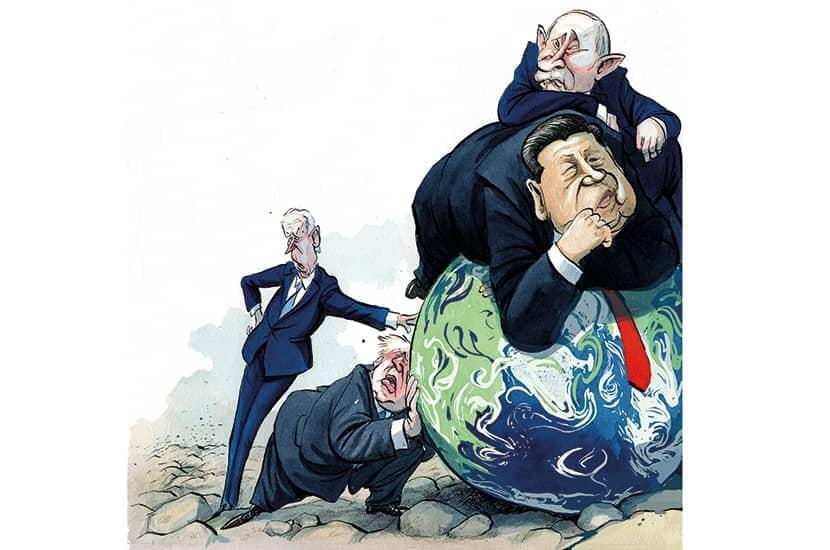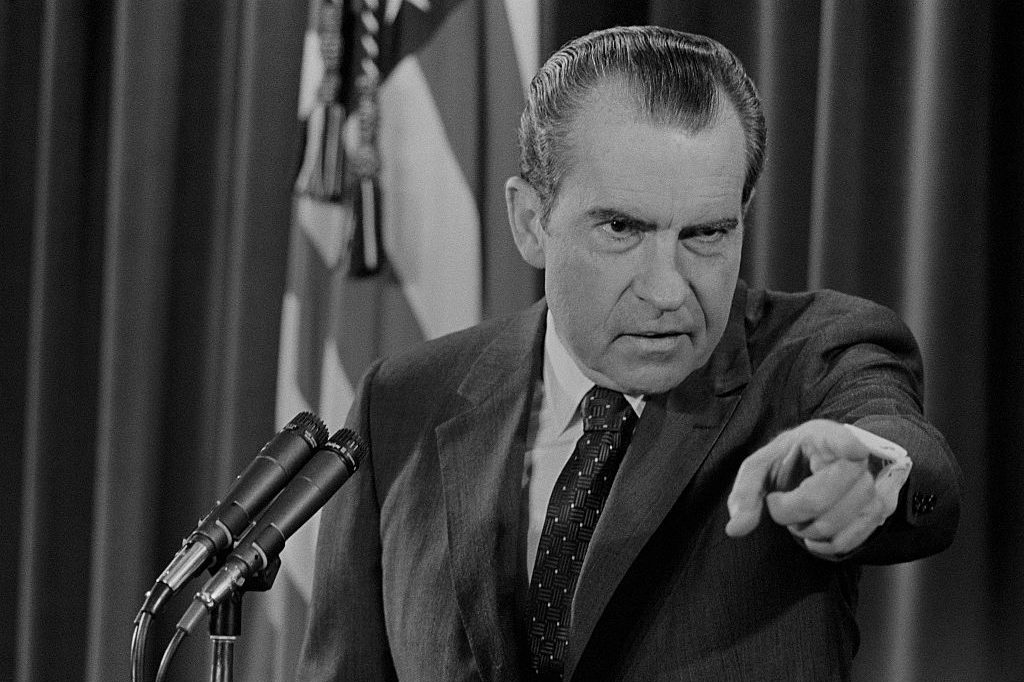As so often, the Queen put it best. While opening the Welsh parliament a couple of weeks ago, she was caught on microphone discussing the COP26 summit and its frustrations. “Still don’t know who is coming,” she told the Duchess of Cornwall. “It’s really irritating when they talk, but don’t do.” In just a few words, she perfectly summed up the challenges facing Boris Johnson in Glasgow.
The British PM wants to get countries to commit to net-zero carbon emissions by 2050. But how to get a deal, if the main players aren’t at the table? Xi Jinping hasn’t left China since the COVID outbreak and will stay put now. Vladimir Putin is weeks away from opening a new pipeline supplying gas to Germany and continues to be quite the energy power broker. He’s remaining in Moscow and will send his regards via video.
Joe Biden says he’ll be there “with bells on” and is set to cut the US’s net greenhouse gas emissions by 45 percent by 2030 — more than double Barack Obama’s target of 18 percent. Powerful talk. But to do anything, he needs Congress to pass his $100 billion green spending package. With a 50-50 Senate, his agenda is being held up by Joe Manchin, a Democrat from conservative, coal-producing West Virginia.
Glasgow has ended up with the classic climate-change summit problem: plenty of protests, but most leaders in no position to make promises — their power limited by parliaments and public consent. To the Queen’s point, they talk — but don’t do. And without Xi or Putin, it’s hard to have talks of much consequence.
Johnson has long seen this summit as the chance to showcase his Global Britain agenda with a quasi-Olympics event, complete with a “happy seal” mascot. The UN has been holding its “conference of parties” — COP — climate-change talks since 1995. Only three have been memorable: Kyoto in 1997, Durban in 2011 and Paris in 2015. The PM wants to add Glasgow to this list.
The Paris summit was a diplomatic coup de théâtre but embarrassingly light on who would do what. Johnson saw an opportunity: everyone could agree global warming should be limited to 1.5 degrees. It would be a firm commitment, meaning almost every country would go much further than at Paris — effectively a promise of net zero for the world by 2050. Alok Sharma, the former business minister assigned to chair COP, was not so sure. Why set a goal only to see it missed?
As Sharma feared, a deal now looks very unlikely. It would need the support of China, but Beijing has started working to its own timetable. Xi declared last month that China intends to keep the coal fires burning for a while yet, with carbon emissions rising for the rest of the decade then hitting net zero by 2060. Over the next eight years, the country’s emissions will soar — and more than undermine whatever reductions are made by Europe. Russia, which is tightening its alliance with China, has also gone for 2060.
Rather than align, the West and the rest are now getting out of sync. We have the 2050 net zero club — America, Europe, Japan — then the 2060 net zero team: China, Russia, Saudi Arabia. This takes us to the problem of COP summits in general: they present the idea of the world agreeing when the world is very much at odds. A few countries, led by Britain, have brought in legally-binding pledges to hit net zero by 2050. A great many others say they share the aspiration but don’t want to pass a law, given that no one knows how this would be accomplished or funded.
The COP summits have also promoted some strange definitions, now coming under more scrutiny. The carbon emissions countries measure relate only to what is produced (rather than consumed) within their borders. Imports don’t count. This has created an incentive to wind down industry and buy things from China instead, where the carbon footprint, per gadget, tends to be far higher. It not only serves to exacerbate the problem but it erodes public support for green policies as people see jobs being moved offshore.
To Oxford’s Dieter Helm, this is where the posturing at COP summits has been worse than useless. Any country can force energy prices up and close down its steel, aluminum and fertilizer factories, and boast that it is reducing territorial emissions. But if people simply keep buying the same stuff via imports (especially from countries that use coal) the policy ends up leading to more global warming, not less.
Germany is perhaps the best example of how to wear a green halo while being one of the Continent’s biggest polluters. Its Energiewende (transition to carbon-free future) started off with dumping nuclear energy. Angela Merkel will be in Glasgow, performing her international swan song. But her decision to drop nuclear power after the Fukushima disaster meant that the country has had to rely more on coal. Germany plans to keep burning it until 2038, giving it a carbon footprint, per capita, closer to China’s than Britain’s. Yet it is one of the most vocal cheerleaders at every COP summit.
Look around and you can see countries getting ready for Glasgow by making their new promises. Australia agreed to join the 2050 club last week. Scott Morrison, the prime minister, gave no indication as to how he’d do it — and has worked out that no one really needs to explain. He responded to mockery by saying he’ll hit net zero “the Australian way.” Prime Minister Narendra Modi of India has said that he won’t be agreeing to any 2050 pledge but will travel to Glasgow to sign an Anglo-Indian solar power deal. With 115 million Indians in extreme poverty, it’s not difficult to understand his competing priorities.
Johnson’s fundamental message is that Modi is wrong, that going green does not mean giving up on prosperity. Hence his promise that net zero can be achieved “without a hair shirt in sight.” This sums up his own blend of green Micawberism: a belief that new technology will make the costs go away. It’s fine to sign a pledge without knowing how you’ll achieve it because as-yet-uninvented innovations will make it possible.
His theory, shared by quite a few ministers, is not entirely fanciful. Recent developments in renewable energy have certainly been astonishing, turning certain industries upside down. Tesla’s market value hit $1 trillion this week when Hertz placed a massive order, saying its customers don’t want to rent petrol cars. So capitalism and consumer choice are now driving the green agenda just as powerfully — perhaps more so — than COP communiqués and government diktats.
You might call this “bright green” Tory optimism, as distinct from the “dark green” outlook that talks about GDP growth as if it were a curse. A recent working paper from Oxford’s Martin School argues that trends in solar, wind and hydrogen power suggest net zero could be achieved within 25 years and will “likely result in overall net savings of many trillions of dollars.” Good news such as this is what the British prime minister is praying for.
After the summit, there’ll be endless discussion about how many countries are working to a 2050 deadline. British ministers will laud the fact that 30 percent of the world economy was covered by these pledges when the UK started preparing for this summit; that figure is now 80 percent. The promises might vary in strength and credibility, but it could be the closest Boris Johnson gets to a win.
The Queen, in the end, will not be at Glasgow. Prince Charles will instead be attending. His own contribution to net zero is an Aston Martin running on bioethanol (or, as he puts it, “surplus English white wine and whey from the cheese process”). In a speech to the UN a decade ago, the Queen pointed out that big changes happen “not because of governments, committee resolutions, or central directives…but because millions of people around the world have wanted them.”
This may yet be true for net zero, if the technology arrives. For now, Glasgow is likely to go down as yet another example of just how little summits can achieve.
This article was originally published in The Spectator’s UK magazine. Subscribe to the World edition here.

























